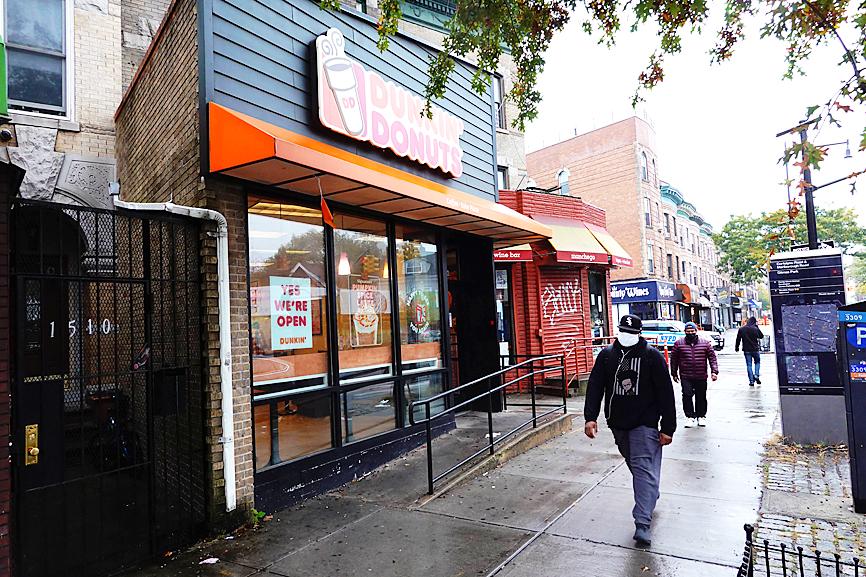Just two years after its founding, Inspire Brands Inc took a major step toward its goal of building a full-spectrum collection of restaurants with the US$11.3 billion acquisition of Dunkin’ Brands Group Inc.
The deal announced on Friday, whose price includes assumed debt, is the restaurant industry’s second-largest transaction and its most expensive at about 23 times earnings before interest, taxes, depreciation and amortization.
Adding Dunkin’ Brands gives Roark Capital Group-backed Inspire its first chain focused on coffee and breakfast, a market facing turbulence from the COVID-19 pandemic.

Photo: AFP
Since bursting onto the scene in 2018 with the merger of Arby’s and Buffalo Wild Wings, Inspire has acquired Sonic Corp and Jimmy John’s, giving it more domestic locations than industry stalwarts such as Wendy’s.
One analyst said that while the breakfast chain has done well in the shifting environment, the valuation is “aggressive” and unlikely to stir any rival bids.
Inspire would take Dunkin’ private at US$106.50 a share, the companies said in a statement on Friday. That represents a 20 percent premium over the closing price of Oct. 23, before reports of the deal talks sent shares soaring, and 6.8 percent higher than Friday’s close.
With Dunkin’ Brands, Inspire would almost triple its number of restaurants to 31,600 worldwide, ahead of Burger King-owner Restaurant Brands International Inc and trailing only Taco Bell parent Yum! Brands’ 50,000 global locations.
The addition of Dunkin’ would also escalate Inspire’s systemwide sales, a measure that includes sales by franchisees, to US$26 billion from US$14.6 billion.
Inspire was cofounded by former Arby’s CEO Paul Brown and Neal Aronson, who started private-equity firm Roark Capital. Inspire is seen as actively involved in the operation of its portfolio companies, pushing changes such as new menu items to reinvigorate sales.
The company “is best known for its turnaround efforts,” KeyBanc analyst Eric Gonzalez said in an Oct. 25 note.
While Dunkin’ does not need a turnaround, the company has recovered from the impact of COVID better than peers, making it a good target to buy with debt, Gonzalez said in a phone interview on Sunday.
“You are essentially going through a major stress test. It gives you a little bit more confidence to be able to handle a higher level of leverage,” Gonzalez said.
Roark also tends to hold its investments over a longer period of time than other private equity firms.
Brown told the Wall Street Journal in 2018 that he wanted to organize Inspire like the Hilton hotel chain, where he once worked, with “brands that span multiple occasions.”
That is unusual in the restaurant industry, where multibrand companies typically own similarly focused chains.
Roark Capital made another restaurant bet during the pandemic, investing US$200 million in Cheesecake Factory in April.
With US$19 billion of assets under management, the Atlanta-based private equity firm has a portfolio that spans across food, health and wellness.
Roark Capital said it was named after the protagonist in Ayn Rand’s book The Fountainhead for its commitment to contrarian viewpoints.

The US dollar was trading at NT$29.7 at 10am today on the Taipei Foreign Exchange, as the New Taiwan dollar gained NT$1.364 from the previous close last week. The NT dollar continued to rise today, after surging 3.07 percent on Friday. After opening at NT$30.91, the NT dollar gained more than NT$1 in just 15 minutes, briefly passing the NT$30 mark. Before the US Department of the Treasury's semi-annual currency report came out, expectations that the NT dollar would keep rising were already building. The NT dollar on Friday closed at NT$31.064, up by NT$0.953 — a 3.07 percent single-day gain. Today,

‘SHORT TERM’: The local currency would likely remain strong in the near term, driven by anticipated US trade pressure, capital inflows and expectations of a US Fed rate cut The US dollar is expected to fall below NT$30 in the near term, as traders anticipate increased pressure from Washington for Taiwan to allow the New Taiwan dollar to appreciate, Cathay United Bank (國泰世華銀行) chief economist Lin Chi-chao (林啟超) said. Following a sharp drop in the greenback against the NT dollar on Friday, Lin told the Central News Agency that the local currency is likely to remain strong in the short term, driven in part by market psychology surrounding anticipated US policy pressure. On Friday, the US dollar fell NT$0.953, or 3.07 percent, closing at NT$31.064 — its lowest level since Jan.

Hong Kong authorities ramped up sales of the local dollar as the greenback’s slide threatened the foreign-exchange peg. The Hong Kong Monetary Authority (HKMA) sold a record HK$60.5 billion (US$7.8 billion) of the city’s currency, according to an alert sent on its Bloomberg page yesterday in Asia, after it tested the upper end of its trading band. That added to the HK$56.1 billion of sales versus the greenback since Friday. The rapid intervention signals efforts from the city’s authorities to limit the local currency’s moves within its HK$7.75 to HK$7.85 per US dollar trading band. Heavy sales of the local dollar by

The Financial Supervisory Commission (FSC) yesterday met with some of the nation’s largest insurance companies as a skyrocketing New Taiwan dollar piles pressure on their hundreds of billions of dollars in US bond investments. The commission has asked some life insurance firms, among the biggest Asian holders of US debt, to discuss how the rapidly strengthening NT dollar has impacted their operations, people familiar with the matter said. The meeting took place as the NT dollar jumped as much as 5 percent yesterday, its biggest intraday gain in more than three decades. The local currency surged as exporters rushed to